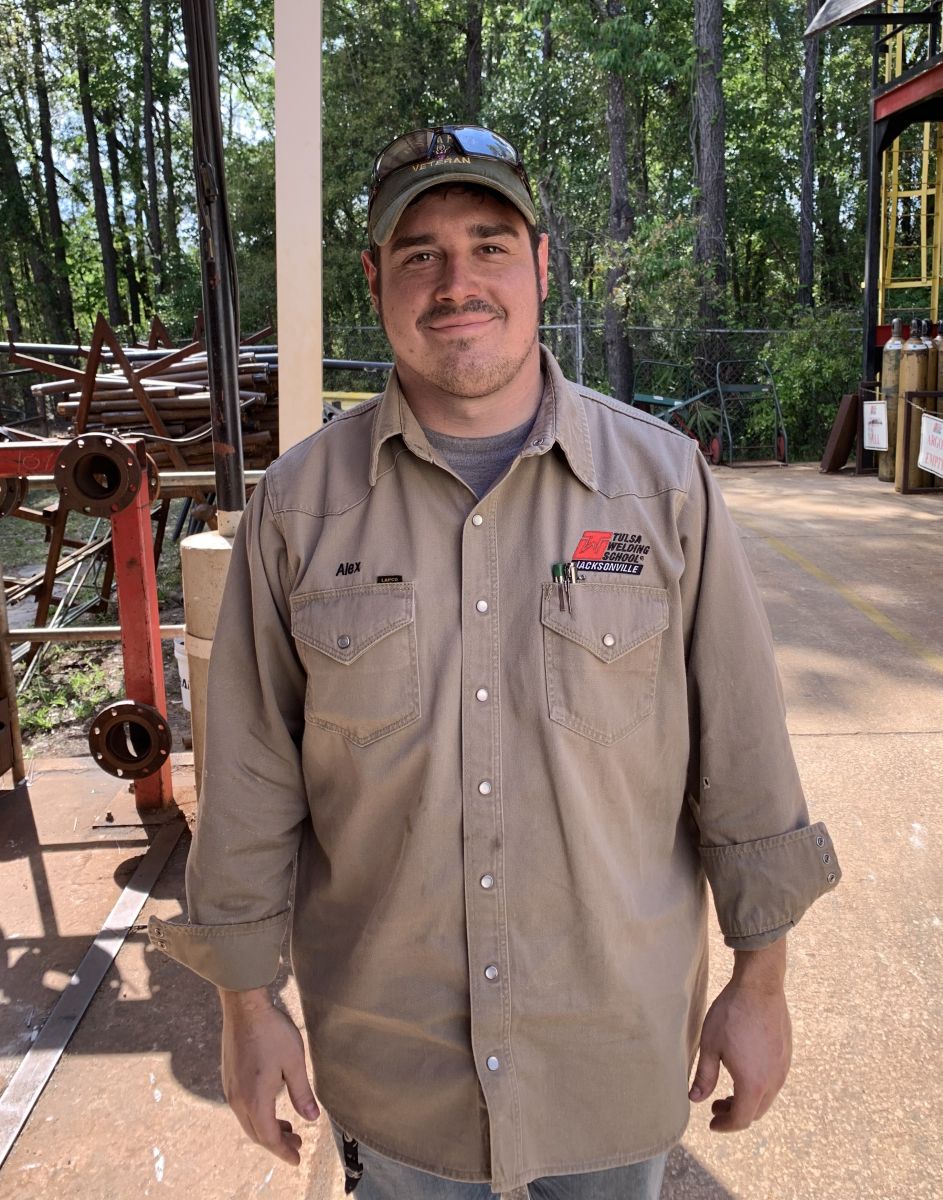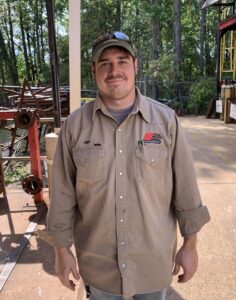
Alex, 30, from Albany, New York, is a Senior Welding Instructor at Tulsa Welding School, Jacksonville campus. Alex has been an instructor at TWS in Jacksonville for four years.
Thanks for your time, Alex; how long have you been welding?
About 15-16 years. I welded in high school. I did two two-year programs back-to-back. That was really beneficial for me because when I graduated high school, not only did I have a plan of what I wanted to do, I also had a job and was certified as a welder. My first job was working as a production welder when I was still in high school. Then, at 19, I joined the U.S. Army as a welder, and I went off on my journey. When I joined up, I knew I wanted to be a welder, so I waited for that position to open and then I spent eight years welding in the Army. I made it all the way up to an E5, a sergeant. I went from basic entry, E1, all the way up to supervisor. That’s pretty much as good as it gets until you’ve got to change your job to meet the demands of the military. After basic training, my first tour was in Germany for four years, and then I went to Colorado for about another three years.
Thank you for your service. What kind of welding work were you doing in the Army?
Well, fabrication is a good generic term for it. Really it was anything and everything; from repairing vehicles, maybe a hasty recovery towing vehicles, to building shelves, to building infrastructure. When the Army deploys somewhere, we have to put up buildings and create infrastructure. That’s where engineers came in, that’s where welders and other trades, like carpenters and plumbers, came in. So, army welding is one of those careers where until you’re in it, you don’t really understand the full potential of your job.
Have You Considered a Career in the Skilled Trades?
Fill out the form to recieve a no obligation info packet.
One day I could fix a trailer for a vehicle, the next I could be welding pipe for plumbing. I just bounced around depending on what was needed. It could be as simple as little petty work, all the way up to building stuff that was going to be delivered somewhere. It had to be picked up, shipped out, and we were just a facilitation at that point. When I got out of the Army, I came straight to Tulsa Welding School.
What made you decide to go into teaching at TWS?
It was like the next chapter for me. I was going from leading soldiers to instructing students and teaching them how to weld. I was at a fork in the road in my military career; one of the options that I could have taken was to be an instructor at the schoolhouse. Unfortunately, the position wasn’t open and there was a really long waiting list. But it did get me thinking that maybe I’d enjoy being an instructor, teaching someone a trade, a valuable skill. I didn’t think about how important that is until I actually started looking for a job, seeing that it was possible for me to get a role like that. I consulted my soldiers and some of my peers. I basically asked them if they thought that I’d be someone that they’d want to learn from.
It’s interesting that you would ask them that. Why did you?
Because in the military you sometimes don’t have a choice about what your job is, you have to mentor or be mentored by someone. You have to do it because of your orders. So, I didn’t really gauge myself on how well I communicated with other people or connected with people on different levels. In the Army, you do what you’re told to do. But I had support from a lot of people that convinced me I could do it. When I applied at Tulsa Welding School, they were looking for instructors; one thing just led to the next.
That makes total sense. As a kid, what did you want to be when you grew up?
I come from a big military family, so I knew I was going to serve at some point. I just wasn’t sure what branch, or what I was going to do. My family has all served; that’s what got them into whatever career they went into or got them retired. So, I had a lot of support from my family about joining the military. But growing up, I knew that I was going to be around some kind of heavy equipment, working outside, building something, working with my hands. I love being outside and doing stuff, no matter what it is. Once I learned how to tinker with things, build things, modify things, I knew that that’s how I wanted to make money.
You’ve been here four years. Tell us what do you enjoy most about teaching at Tulsa Welding School?
What I like best is the outcome for students. There’s a lot of hard work that has to go into this, if a student wants to be successful. They need a lot of patience above all things. But the outcome is very rewarding. I love to see students getting jobs, being successful, starting to make more money than they did before they came into the program. Seeing people actually turning their life around, or just improving their life by doing something different is very rewarding. I’ve come across a lot of people who didn’t realize that they could even do a trade. People who didn’t go to college, didn’t come from a family that had a family business, or give them a lot of support. So, to give our students a purpose and then to see them take that purpose and do something with it, for me, that’s the reward.
Tell us something most people don’t know about you?
I’m not native to Florida, so I like to do a lot of outdoor activities. I don’t think a lot of people take me for an outdoorsman because I’m kind of quiet, a little introverted, but I do like to be outside.
So, tell us about your own family, Alex. Are you married?
I’m not married, no kids. I have family here in Florida. My siblings live pretty much from here in Jacksonville all the way down to Miami. Not all of us are really close in proximity, but we all live within the state.

What’s the biggest piece of advice you’d give to new students?
My biggest piece of advice would be to make a plan now for your career beyond school. There’s a lot of good that can come from making a plan. Maybe make two plans, or better yet three. You don’t have to call it a fallback plan, just an alternate route, especially for a new student who’s just starting out. The world is your oyster, as they say. So, you don’t want to have tunnel vision when it comes to your future, especially when you learn a trade like welding.
You can do anything with it. You could build on it and go to a different school to become a specialist, like a commercial diver, and go do underwater welding. Or you could travel and work shutdowns on boilers or run pipelines and make a lot of good money really, really quickly. Then there’s also the small business aspect to it. A good chunk of our students wants to learn welding for the hobby, they want to learn because it’s a very useful skill. Maybe later on down the road, they’ll open up some kind of fabrication business or automotive business. But it all starts with a plan. Definitely make a plan and then just make a ‘Plan B’. Just in case your direction changes a little as you get towards graduation. Maybe you discover you like a certain process more than what you had originally set your sights on.
What did you enjoy most about being a welder out in the field?
Doing good work around a good group of hardworking people, that was the best part about it. Also, the fact that welding is just really cool. There’s nothing really like it. I mean, you see roofers all the time, and carpenters and framers. You see masonry workers, construction workers, but there’s just something about welding. It’s just a little bit cooler than everything else. You wear cool PPE, you get to do cool procedures, and not to mention there’s really only a handful of people out there doing it now. There’s not thousands and thousands and thousands of welders anymore. We’re really in desperate need of them.
You get an unexpected day off to yourself, what would you do with that time?
I’d probably go fishing if the weather’s right. If it’s summertime, I’ll definitely be out on the water! I do have a boat that’s best to fish out of, but sometimes if I’m just trying to go for a quick evening fish, I don’t necessarily want to put my boat in the water, so I’ll just fish from the beach.
If you were to tell someone “Thank You” for making you the man you are today, who would it be?
It would be my high school welding instructor, Scott Combs. I believe he’s still teaching high school welding; he’s just been a role model my whole life since high school. He was in the military. He was an Air Force welder who retired and then made a career out of it. He became a welding instructor among other things, but he just really always seemed like a really cool guy.
Thank you, Alex for your contributions to TWS!




